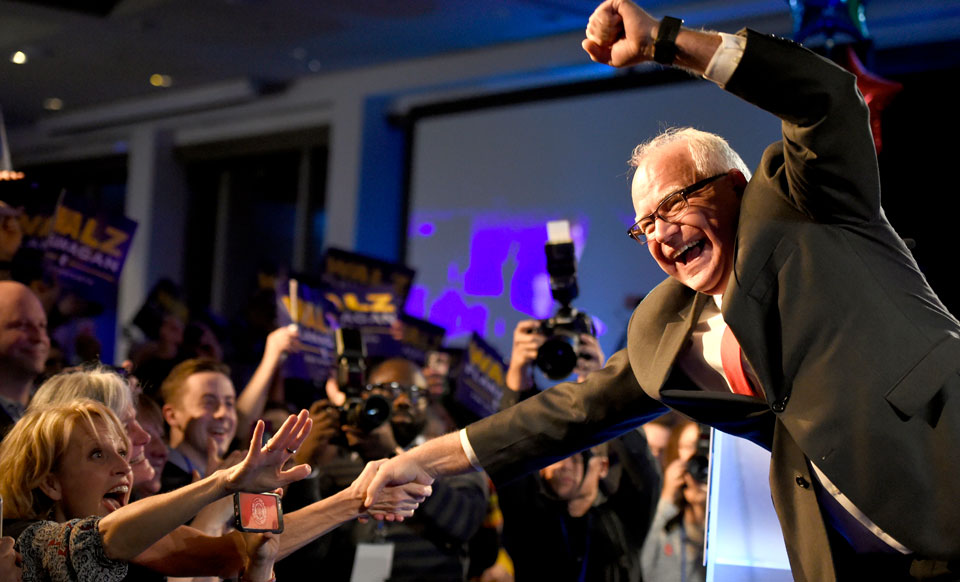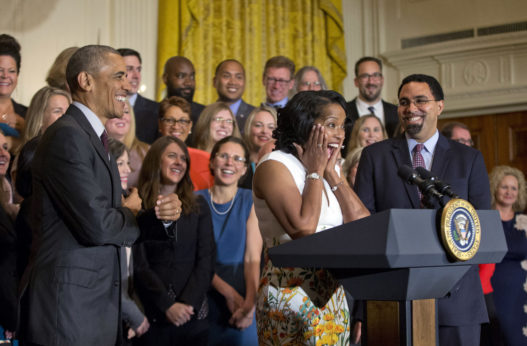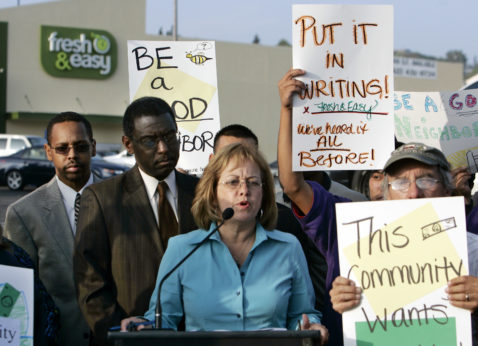
WASHINGTON—Led by Minnesota’s Tim Walz, some 743 unionists—and counting—won public office nationwide, from Congress down to county commissioner, the AFL-CIO calculates.
Walz, a member of Education Minnesota—the joint AFT-NEA affiliate in the state—and a Mankato High School history teacher, was the Democratic-Farmer-Labor congressman from the GOP-leaning 1st District for the last 12 years. Now, Walz will be Minnesota’s governor, and organized labor’s highest-ranking elected official.
Walz beat his Trumpite GOP 54 percent-42 percent on Election Day. And Julie Blaha, the former Minnesota AFL-CIO Secretary-Treasurer and also a former teacher (AFT), joins him among the state’s top four officials. She won the auditor’s post, 49 percent-42 percent.
Walz, Blaha, National Education Association member and history teacher Jahana Hayes, and former top Unite Here Nevada official Steven Horsford headline unionist winners on Nov. 6.

Hayes, a Waterbury, Conn., social science teacher and 2016 National Teacher of the Year, won the open 5th Congressional District seat on a progressive platform—including Medicare for All and $15 and a union—after defeating the establishment favorite in the Democratic primary. Horsford, former head of Unite Here’s training academy in Las Vegas, reclaimed his old congressional seat in the Las Vegas suburbs. Both are African-Americans.
They join other active unionists in the Congressional Labor Caucus: Reps. David Norcross of New Jersey and Linda Sanchez of California (Electrical Workers), Mark Pocan of Wisconsin (Painters), and Stephen Lynch of Boston (Ironworkers). Norcross headed the Southern New Jersey Building Trades, while Sanchez is former Secretary-Treasurer of the Orange County, Calif., Central Labor Council.
Unionists also increased their numbers among state and local officials. Maria Elena Durazo, longtime Unite Here official and Executive Secretary-Treasurer of the Los Angeles County Federation of Labor, will now be a state senator from eastern Los Angeles. She won by a 62 percent-37 percent margin.

Indeed, though the fed didn’t say so, many of the winning unionists did so handily. Pocan topped them: He was one of the few lawmakers who were unopposed.
Teamsters member candidates won four state House seats. Jeff Kurtz, (Brotherhood of Locomotive Engineers-IBT) won an open Iowa House seat. So did Susan Martinez, now a Nevada state rep, but also a shop steward and 30-year Local 986 member at Las Vegas’s Flamingo Hotel, won there.
Dave Delloso of Local 312 in Chester, Pa., and Steve Malagari of Local 830 in Philadelphia won open seats in the Pennsylvania House, even as it stayed Republican. “I want to go to Harrisburg and represent a class of people who are tired of being forgotten,” Delloso had told Teamster magazine. Angie Bodine of Local 777, challenging a GOP state House incumbent in downstate Illinois’ District 69, was in a race that’s too close to call.
The Teamster candidate with the biggest local impact also won: Incumbent Cook County (Chicago)
Commissioner Luis Arroyo, Jr., part of the panel’s reform bloc, coasted to victory on the city’s Northwest Side-based district.
So did the county commissioner with the smallest impact: Roger Parsons, a former Local 61 officer and UPS retiree, who sought his first full term in that small—population 14,294—jurisdiction. He told Teamster he’s “fighting for the working men and women” of his county.
The union winners even extended to D.C.: The only two unionists on the ballot—City Council member Elissa Silverman (News Guild) and Board of Education member Ruth Wattenberg (Teachers)—both won handily despite intense opposition from corporate interests, city Mayor Muriel Bowser and Silverman’s former employer, The Washington Post. Business and Bowser hate Silverman for pushing paid sick leave and an eventual $15 minimum wage for tipped workers.
There were other changes that helped workers on Election Day, even if the effect wasn’t immediately obvious. Walz not only won in Minnesota, for example, but also—aided by a strong effort from the state fed—dragged in a DFL majority in the Minnesota House. The State Senate stayed Republican.
The New Hampshire legislature was one of six states that flipped to pro-worker Democratic control, even as GOP Gov. Chris Sununu won again there. And Democrats picked up enough seats in the heavily GOP-gerrymandered North Carolina legislature—after a strong campaign by the state fed and civil rights groups—to end the GOP’s veto-proof majorities. Democratic Gov. Roy Cooper won in 2016 and the GOP solons promptly stripped him of power, while passing an illegally anti-black “voter ID” law.
One California initiative workers opposed went down the drain. Corporations and the right wing tried to roll back a gas tax hike the Democratic-run state legislature and retiring Gov. Jerry Brown (D) enacted, to help fund the state’s schools. Initiative foes lost.
In Nevada, Asian-Pacific American Labor Alliance Executive Director Alvina Yeh reported the group, which concentrated its effort there and in four other states, helped elect pro-worker Rep. Jacky Rosen (D) to the U.S. Senate, ousting a Republican incumbent—and enact automatic voter registration at the state Department of Motor Vehicles.
And in Harris County (Houston) Texas, voters ousted two right-wing “good ol’ boys” from the county commission, including its chair, as two Latino Democrats won. That’s important because the panel controls a $2 billion budget. The one pro-worker progressive who did not, Penny Morales Shaw, still got 45 percent of the vote in a deep-red county council district. Houston voters also approved a 10 percent raise for firefighters. And Dallas County unionists helped turn the city’s state senate delegation blue. The final tally was Democrats 12 seats, Republicans two—in a map the GOP gerrymandered in 2011.
The AFL-CIO reported the 743-and-counting workers elected to public office were part of a wide effort that included 2.35 million door knocks, five million worksite flyers, more than 12 million mail pieces, and 260,094 text messages—-and 69 million “impressions on social media.”
The result: “Union members made our voices heard loud and clear,” said AFL-CIO President Richard Trumka. “Working people trust our unions, and that trust was at the core of an unmatched political program… In every corner of the country, working people showed up to fill the halls of power with union members and our allies. We made clear that we won’t stand for those who prioritize the demands of an elite few—whether they’re anti-labor Republicans or pro-corporate Democrats.”












Comments